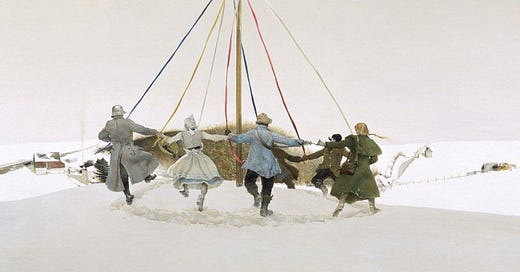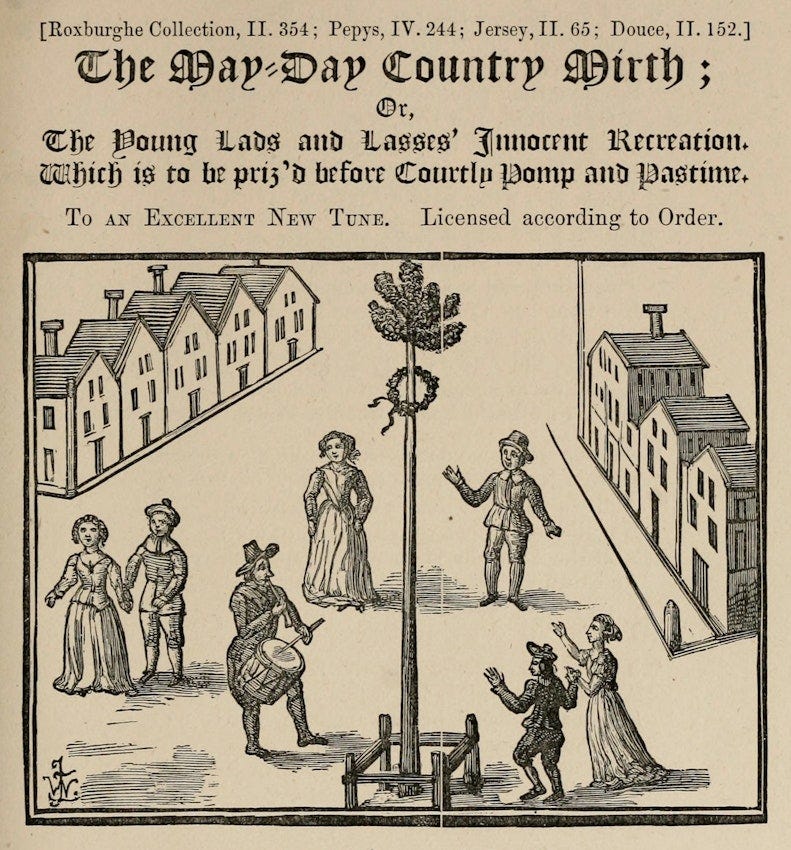Merrie Maypoles & Christmas Tragedy Songs
I’ll be honest, I like Christmas. Raised Jewish, I certainly understand how my brethren feel alone and alienated during this season. My family’s weird trips to places like Puerto Rico during winter break didn’t help. But it took many years to realize that what I like about Christmas is the “Merrie” part.
Today “merry” conjures up sentimental old Coca-Cola ads, or the stupid never-ending chatter about the “War on Christmas”- a discourse far too stupid to even wade into. But it wasn’t always so. “Merrie” once meant something far less innocent. To understand this, we can look to the ultimate symbol of Christmas, the Christmas tree.
…according to Judith Flanders’ Christmas: A Biography. Flanders posits that a precursor to the Christmas tree can be seen in the pole that parishes would decorate with holly and ivy, like a “winter Maypole” History of the Christmas Tree
One precursor to the Christmas tree was a winter maypole, and maypoles had a clear “merrie” connection that formed a seminal moment in American History. The story goes back to 17th century colonial New England. While we are very familiar with the stern Puritans, there was also a very different kind of colony, a “neo-pagan experiment” founded by radical poet Thomas Morton named Merrymount. And at is heart was a maypole.
As Morton recounts, [the erection of the maypole] was decided to mark, on May 1, 1627, this new naming of the colony with a party of “Revels and merriment after the old English custome”. For the occasion Morton set up a gigantic maypole, a “goodly pine tree of eighty feet long . . . with a pair of buck’s horns nailed on somewhat near unto the top of it, where it stood as a fair sea mark for directions on how to find the way”. Settlers and local Massachusett alike were encouraged to join in the revelry for which there was “brewed a barrell of excellent beare and provided a case of bottles, to be spent, with other good cheare, for all commers of that day.”4 Such mixing with Native Americans and drunken carousing around a maypole, with its pagan associations, was a direct affront to Morton’s Puritan neighbours.
As you can imagine, it didn’t last long. After about a year of this, the Puritans, under Myles Standish, invaded, chopped down the pole, shackled Morton and sent him back to England, which was anything but merrie at the time. Anyway, the whole story is even more betterer than this short summary and you should check it out. Back to “Merry”- Here’s a poem of Morton’s entitled “Songe”,
Drink and be merry, merry, merry boyes;
Let all your delight be in the Hymens joyes;
Iô to Hymen, now the day is come,
About the merry Maypole take Roome.
Make greene garlons, bring bottles out
And fill sweet Nectar freely about.
Uncover thy head and feare no harme
For hers good liquor to keepe it warme.
Then drinke and be merry, &,
Iô to Hymen, &,
Nectar is a thing assign’d
By the Deities owne minde
To cure the hart opprest with greife,
And of good liquors is the cheife.
Then drinke, &
Iô to Hymen, &
Give to the Mellancolly man
A cup or two of ’t now and than;
This physick’ will soone revive his bloud,
And make him be of a merrier moode.
Then drinke, &
Iô to Hymen, &
Give to the Nymphe thats free from scorne
No Irish stuff nor Scotch over worne.
Lasses in beaver coats come away,
Yee shall be welcome to us night and day.
To drinke and be merry &
Jô to Hymen
I’d like to see that at the bottom of a CVS receipt. Note the classical references. Merrie, whether it be about “old England” or Bacchus, always had a nostalgaic tinge. And with perhaps good reason. By now Christmas’ roots in the old Roman Saturnalia or even earlier Egyptian Horus celebrations are common knowledge. And these celebrations were anything but silent nights. This is why it is no surprise that the Puritans held Christmas in the same contempt as the maypole,
Cotton Mather, New England's most influential religious leader, told his flock in 1712 that "the feast of Christ's nativity is spent in reveling, dicing, carding, masking, and in all licentious liberty...by mad mirth, by long eating, by hard drinking, by lewd gaming, by rude reveling!"
Long eating! The nerve!
This kind of a Christmas more closely resembles the May Day celebrations (and indeed, JC was likely born in spring, oy, who can keep up?) In this context, the Christmas tree can be seen as it truly is- a winter Maypole. The maypole even has an antler connection (at the top of the maypole were antlers). The puritans and their real, actual war on Christmas (oh the irony!) has to be seen in the context of the tumultous 17th and early 18th centuries, a time of heresies and extremes. As that era shook out, the excesses became tamed,
In his Poor Richard's Almanac of 1739, Philadelphian Benjamin Franklin wrote of Christmas: "O blessed Season! Lov'd by Saints and Sinners / For long Devotions, or for longer Dinners."
Some see this nostalgaic twitch as necessarily reactionary. Maybe. But for all its faults, nostalgia is at least way to dream a little in this time of capitalist realism. A rare chance to imagine some kind of human warmth. All you have to do is choose to hear “merry” with the “ie” on the end.
Part Two: Christmas Tragedy Songs
All this merriment has a dark side too. A close look at Andrew Wyeth’s Pennsylvania surrealist Snow Hill depicts a worrisome German character. This is not mere fantasy- Wyeth spent much time with the neighboring Kuerners, who were German immigrants and whose telltale helmet found its way into Wyeth’s sketchbooks.
Andrew feared and admired Kuerner, who alternated big-heartedness and violence, beating his daughters while his wife, Anna, slowly went mad.
According to the NYT
Karl was an avid hunter and a former German machine-gunner in World War I who died in 1979, at 80. There were rumors that he was a Nazi sympathizer, which drove Wyeth during World War II to search the Kuerner house for a wireless spy transmitter.
At any rate, at least Wyeth was telling the truth. Snow Hill shows the uneasy connection between revelry and violence. Pogroms often happened during holidays, when soldiers were home and drinking was prevalent. Part of my own family left Europe after the Kishinev Pogrom, which happened during Easter. A simple Google search will give you more than enough Christmas pogroms to ponder.
Alas, getting drunk and dancing around a pole is not the answer to the world’s problems.
“Terrible songs make big songs” as Abner Jay says. So here’s a playlist I’ve kept over the years of Christmas songs you might not hear suggested by Spotify. They may not be merrie, but they are a reminder that our saturnalian dreaming need not be sentimental, since these songs are, like Wyeth’s painting, true.
Blind Willie McTell’s Delia
Stanley Brothers’ Lawson Family
“It was long last Christmas evening
The snow was on the ground…”
Woody Guthrie’s 1913 Massacre
“See what your greed for money has done…”
Sophronie Greer’s Triplett Tragedy:
“On Christmas morning at 9 O clock, the people met an awful shock…”





